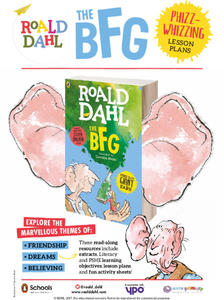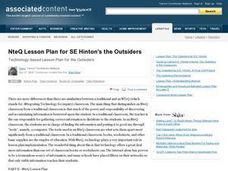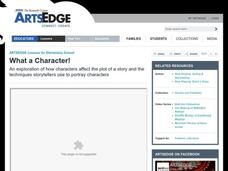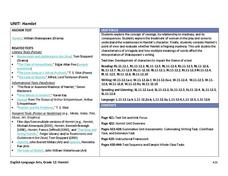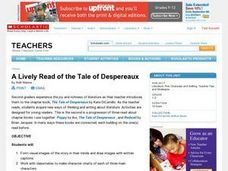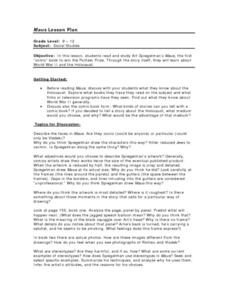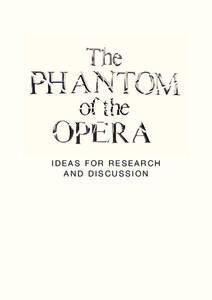Curated OER
Survivor: Not Just a TV Show -- An exploration of the character traits of survivors of the teenage years
Students examine the issues that many male and female teenagers are forced to deal with during their adolescence. They analyze characters from different genres through comparing and contrasting their stories and the skills they used to...
Curated OER
Explore, Analyze and Imagine: The Importance of Body Language
Students develop characters and role-play. In this character portrayal lesson, students analyze the importance of body language, develop a character to portray and interview another students character.
Curated OER
Imagine That! Analyzing Imagery
Poems by O. Henry, Marion Dane Bauer, Monty Roberts, and Langston Hughes provide the text for a study of symbolism, hyperbole, and imagery. Employing the “think-pair-share” strategy learners generate definitions of these terms and locate...
Curated OER
The Antagonist's Point of View
Analyzing literary antagonists is a first step to creating memorable characters in student writing.
Curated OER
Character Attributes in Writing
Third graders analyze the importance of characters in fiction writing and performances. In this theatre instructional activity, 3rd graders identify the important characteristics of a fictional character and how to portray a character...
Roald Dahl
The BFG Lesson Plans
A 55-page unit examines the novel, The BFG, by Roald Dahl. Six lessons pay close attention to friendship, dreams, and believing themes while analyzing interesting characters, writing creative vocabulary, smilies, metaphors, an exciting...
Curated OER
NteQ Lesson Plan for S.E. Hinton's The Outsiders
Explore literature through the completion of reading comprehension worksheets in class. After reading the classic book, The Outsiders by S.E. Hinton, middle schoolers review each chapter by completing study questions and story webs....
Curated OER
Lab 2: Drag Racing
In this activity, students, Analyze the relationship between velocity and acceleration * Calculate an object's average acceleration * Collect data and interpret it* Create and analyze a graph showing acceleration.Students also work in...
Curated OER
"Croak" Science Mystery
Solve the mystery of a declining frog population! Lead your junior ecologists on an investigation that simulates actual events concerning pollution, predation, poaching, and more. Investigators read a story online, then analyze survey...
Curated OER
Dear Diary
Students analyze a piece of writing by creating diary entries based on a character. In this reading comprehension lesson plan, students read an assigned book with their classmates and create a sketch of what they believe the main...
Curated OER
What a Character!
Students look at the role of characters in a story. For this character lesson, students discuss how different types of characters change the plot of the story. They see how storytellers use their body, face, and voice to tell stories.
Curated OER
Knights of the Round Table adapted by Gwen Ross
Everyone loves the tales involving King Arthur and his knights. After reading Knights of the Round Table by Gwen Gross, learners draw inferences and conclusions, analyze story elements, and discuss figurative language, including...
Louisiana Department of Education
Unit: Hamlet
Encourage readers to determine if Hamlet's madness is actually divinest sense. Class members analyze the words of the play before studying related texts, including T.S. Eliot's "The Love Song of J. Alfred Prufrock," scenes from...
Curated OER
What If: The Seed Of A Story
Students read and comprehend a piece of fictional writing, analyze how setting, characterization, and plot affect the theme of a story and work in a group to create a new writing assignment. This 5-day plan culminates in students writing...
Curated OER
Lively Read of the Tale of Despereaux
Students create a character map of the main characters in The Tale of Despereaux. After reading the text, students create a character chart based on information they gleaned from the story. They use this information to write a letter...
Curated OER
Characterization
In this characterization worksheet, students fill out a graphic organizer chart. Students write the character's name in the center and an example of each of the 4 characterization methods by the author. There are instructions to help.
Curated OER
Character Comparison Worksheet
In this characters worksheet, students choose 2 characters to analyze, list the characters similarities and differences in the boxes provided.
Curated OER
Exploring Arthurian Legend
Learners investigate the evolution of the King Arthur stories and analyze them as a window into the culture that preserved them. They trace the legends through their earliest versions through medieval and Victorian times and into the...
Curated OER
It's Your Opinion
Everyone has a different opinion about the characters they read about in books. Have your class explore forming an opinion and finding evidence to support it as they read and discuss what they think about a particular character. They...
Curated OER
To Kill a Mockingbird: Theme
So many themes are expertly woven through Harper Lee's novel, To Kill a Mockingbird. On the first page, scholars will read five themes, selecting an incident and a quote to highlight that theme. On page two, they use chapters 29-31 to...
Curated OER
Maus Lesson Plan
The artistic choices Art Spiegelman made in his graphic novel, Maus, are the focus of an exercise that asks class members to compare classic comic book forms with Spiegelman’s panels and frames. Directed to specific pages and guided by a...
Federal Reserve Bank
Your Budget Plan
What do Whoosh and Jet Stream have in common? They are both characters in a fantastic game designed to help students identify various positive and negative spending behaviors. Through an engaging activity, worksheets, and discussion,...
Phantom of Opera
The Phantom of the Opera: Ideas for Research and Discussion
You could spend a full day discussing The Phantom of the Opera and not scratch the surface, but a set of lessons about the literary elements and themes of the musical production is a great start. Young thespians build upon the background...
Smithsonian Institution
Mobilizing Children
Scholars find out how the government used propaganda to mobilize children to help in the war effort. Lesson exercises include analyzing a quote from Franklin Roosevelt, viewing propaganda images and posters, and participating in a lively...







